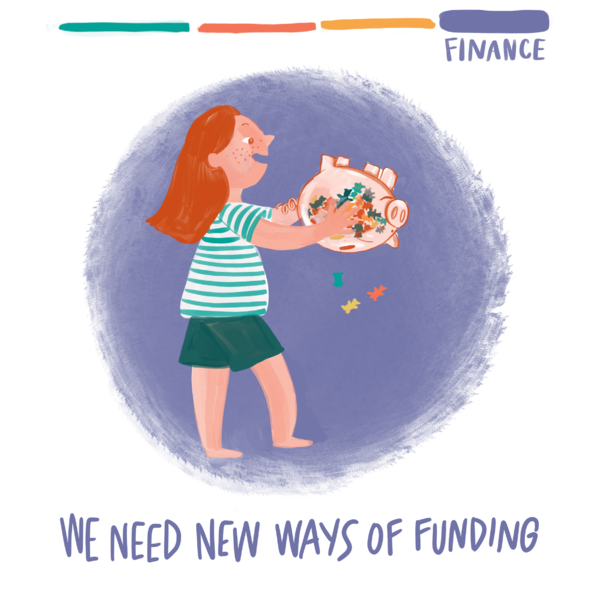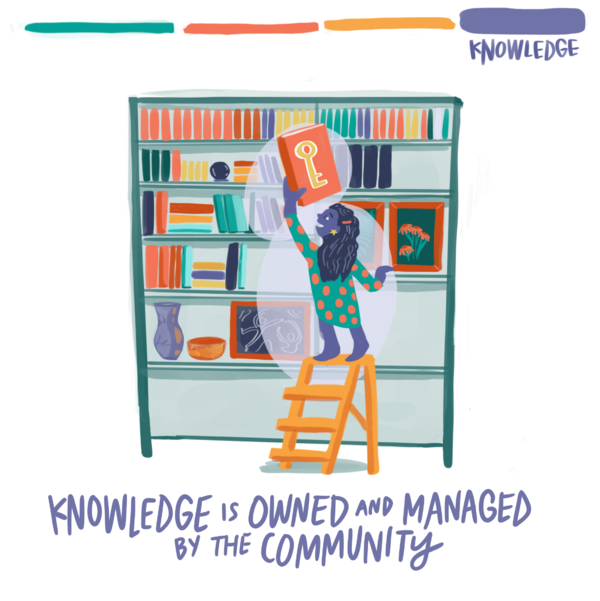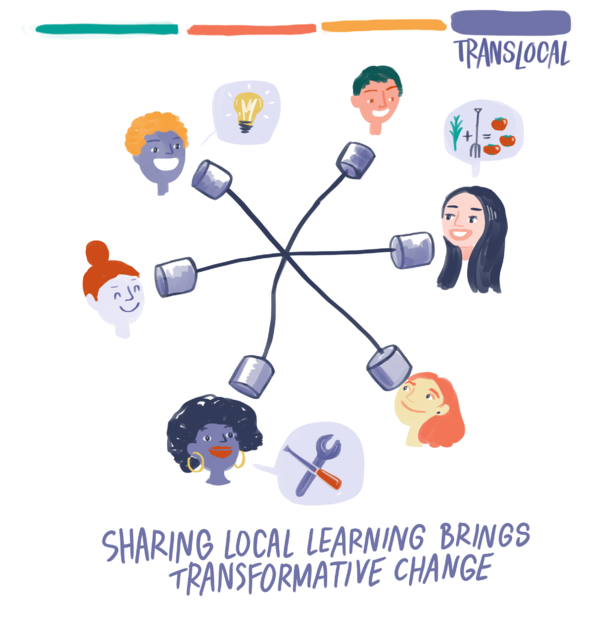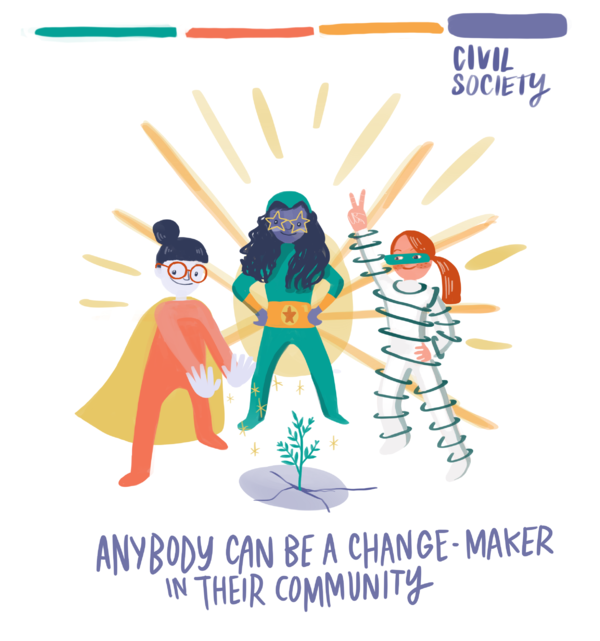Informed
Discover 4 keys to make cities informed:
#Finance - We need new ways of funding
Sustainable and just cities take a critical and values-led approach to the accumulation, use and distribution of capital. Individuals and local governments reorient their consumption to value positive social and environmental outcomes. Governments at all levels play a significant role in funding sustainable and just institutions, while divesting from the ones that do not match their values. Ethical procurement and accurate certification (e.g. fair trade, organic) is promoted.
Related keys: #ResearchAndInnovation #Economy #Responsibility
What approaches can activate this key?
Alternative financial practices and instruments respond to the need for and the wish to build regenerative, equitable and democratic economies. One innovative approach to new ways of funding is Participatory budgeting, a democratic process in which community members decide how to spend part of a public budget. The approach gives people real power over real money. It creates opportunities for citizens to directly participate and engage in policy debates and funding, promotes transparency and provides historically excluded citizens access to important decision-making venues. Other approaches that activate this key are Crowdsourcing, Beyond GDP indicators, Right to housing, and Sharing and cooperatives for urban commons.
What governance arrangements enable this key?
The governance arrangement that best enables this key is “developing resilient and self-sufficient financial arrangements,” which puts initiatives less at risk of failure or severe hardship when funding sources disappear. For example, many communities’ initiatives heavily rely on public funding which, as we saw with the Covid-19 pandemic, could become less stable in times of austerity or shifting of political priorities. More resilient financial arrangements involve considering and mitigating these risks where possible. However, these finance sources should be aligned with the values of the initiative, alongside its environmental and social goals.
What drivers of injustice does this key address?
This key challenges the driver of injustice “neoliberal growth and austerity urbanism,” in that it acts against privatization, commercialization, budget cuts and state withdrawal from various sectors. It also works to overcome the ideology of unfettered economic growth, which often aligns with austerity policies. This key also directly addresses the driver of injustice “material and livelihood inequalities” as urban sustainability efforts reflect the distribution of economic resources, and can therefore reinforce or work to address unjust outcomes. This key also addresses limited citizen participation in urban planning, in which residents have little say in how public money is spent, and unfit institutional structures, which manifests when public offices and administrations stand in the way of developing fitting financial schemes that truly enable sustainable and just cities.
Extra insights from UrbanA Community
- We need to explore more ways of public funding for the urban commons.
- Residents need to have a say in how public money is spent.
- There should be more financial opportunities for communities and residents who want to engage in making their neighbourhoods more just and sustainable.
Inspirational example: Inclusive waste management, Rzgow, Poland
In 2017, the Municipality of Rzgow (Poland) launched a procurement tender, which aimed at coupling their sustainability waste management plan with social inclusion.
The City announced a reserved tender procedure which would award marginalized groups with a contract for waste management. In this tender, marginalized groups were persons falling in one (or more) out of several categories: Unemployed persons, persons deprived of liberty of released from prisons, persons with mental disorders, homeless persons, persons granted refugee status or persons belonging to disadvantaged minorities. The tender also included environmental requirements, such as standards for recycling, recovery and reuse in line with the local sustainability plan. The tender was won by Komunalka Rzgów, a local social cooperative employing long-term unemployed people and people with disabilities. The main activity of the cooperative was to be responsible for the collection and sorting of waste. This example shows how cities can take ownership of their funding and re-channel money towards initiatives that centre environmentally sustainable and socially inclusive activities.
You can read more about this inspirational example here (p. 174).
Avenues for action
Lobby for new funding opportunities and criteria
- Advocate and lobby for new funding opportunities and reallocate existing funding for initiatives which have the potential of strengthening the link between justice and sustainability.
- (Re)consider exclusionary requirements to get funding and make justice and sustainability part of the funding criteria (e.g. climate-sensitive participatory budgeting, positive discrimination).
Learn more about Participatory budgeting.
Make wide-ranging funding opportunities visible
- Make an overview of funding streams across different sectors as to help initiatives working on justice and sustainability to become aware of different funding opportunities.
- Provide support in accessing these fundings (e.g. municipalities providing consulting for local communities in applying these funds).
- Private actors and philanthropic organisations wishing to support specific social groups can benefit from identifying and working with non-profits who have pre-existing connections to these groups.
Get inspired by the Ecohouse Antwerp, a one-stop-shop for households offering all city services on sustainable building and living, also giving loans or grants. Listen to Tom Meeuws, Deputy Mayor of Antwerp, talk about his city's work.
#Knowledge - Knowledge is owned and managed by the community
Creating sustainable and just cities is a learning process. Knowledge is created through collaboration at the community level between policy-makers, planners, residents and others. All benefit from this knowledge. Policymakers and political actors, including those from higher levels of governance such as the EU and the UN, advocate for tailored approaches and policies based on knowledge commons (collectively created information) and other forms of citizen science.
Related keys: #Accessibility #Responsibility #Participation
What approaches can activate this key?
Co-learning and knowledge brokerage, based on collaborative forms of knowledge generation like co-production, co-inquiry, community-based and community-led research, participatory action research and Citizen science, are key processes in the effective co-generation and mobilisation of knowledge. They depend on effective Data collection, and ideally sharing of data, which can draw on the aforementioned citizen science and other forms of collaborative inquiry. This may take place within the context of Crowdsourcing efforts that invite people from all walks of life to contribute to identifying issues and courses of action. Integral MetaMapping can also help develop a common language that links different kinds of stakeholder knowledge.
What governance arrangements enable this key?
Any meaningful participation process requires both that citizens are well-informed, and that their knowledge and insights are taken into account. Creating a comprehensive vision of change also means drawing on and bringing together the knowledge of diverse stakeholder groups in a city. Accessing this knowledge means it is necessary to tap into existing community networks, while exchanging knowledge and information is, in itself, an important way to build bridges between different stakeholder groups.
What drivers of injustice does this key address?
This key is a direct remedy for a Lack of effective knowledge brokerage and stewardship opportunities. Wider access to knowledge is crucial to overcoming Limited citizen participation in urban planning, and can help address weakened civil society. Sharing knowledge more widely and ensuring that decision-making processes and organizational structures both enable and reflect this is an important part of overcoming unfit institutional structures.
Extra insights from UrbanA Community
- The big challenge will be to transfer knowledge to citizens and enable citizens to create and share knowledge. (Davie Philip, Sustainable Ireland)
- Design thinking, citizen science and the arts could all play key roles in empowering communities to collect and create collaborative data, and build knowledge commons. (Davie Philip, Sustainable Ireland)
- I think accessibility should also be beyond physical spaces: How to access information, how to communicate through e-platforms, how to access education, how to access democratic online participation tools. Is information from the city website accessible? Can people understand what it says? Can they see what it says? Are all the city apps accessible?. (Pilar Orero, Universitat Autònoma de Barcelona)
Inspirational example: The city as commons, Ghent, Belgium
The Ghent Commons Transition Plan was commissioned by the Mayor and Council of Ghent in Northern Flanders.
Its aim was to document and understand the emergence of the commons in the city in order to identify what forms of public policy could best support its further growth. It was developed on the basis of a broad participatory inquiry during early 2017, which aimed to capture the knowledge of those involved in sustainability and equity initiatives across the city. A key outcome was understanding the city itself as a commons, in which active co-creation and exchange of knowledge support collaborative action between authorities and local residents. One such initiative explored in the process was the Living Streets project, which supports citizens in redefining urban spaces by closing streets to traffic for extended periods.
Avenues for action
Connect economy and ecology in learning programmes
- Reconsider and redevelop what knowledge we teach and how we teach it by incorporating sustainability and justice (e.g. Doughnut Economics) in curriculums and other learning programmes.
- In economics programmes in particular, champion the need for a curriculum which includes an ecological perspective, recognising that these two concepts are intrinsically connected.
Learn about the Doughnut Economics Action Lab. Listen to Satish Kumar explaining the conceptual and etymological connection between economy and ecology.
Use creative ways of making knowledge accessible
- Experiment with new, alternative and accessible ways to create, manage and share knowledge. Use storytelling methods, visualisation and mapping (e.g. GIS), and 1-on-1 discussions as means of communicating knowledge.
Get inspired by [UrbanAPI (Interactive Analysis, Simulation and Visualisation Tools for Urban Agile Policy)|UrbanAPI].
#Translocal - Sharing local learning brings transformative change
The inhabitants of sustainable and just cities learn from and with each other as they experiment with social innovation and path-breaking solutions. Though locally-rooted knowledge is vital, its translation to other locations, contexts (e.g. rural areas) and spatial scales (e.g. national, regional, global) inspires transformative change. This is also referred to as “translocal learning.” Cities are connected through networks, but translocally inspired solutions are neither copy-pasted nor imposed top-down; they are shared and then adapted to specific contexts. City-makers are unafraid to share their mistakes, so that all can learn from them.
Related keys: #Knowledge #Regional #Participation
What approaches can activate this key?
Co-learning and knowledge brokerage activate this key by providing multi-stakeholder platforms that operate with the aim of sharing and transferring knowledge and methods for tackling urban challenges. One example of such a method is creating Experimentation labs that focus on creating experiential environments where policy makers and citizens design, explore, experience and refine new ideas (policies, regulations, technologies etc.) in real-life scenarios. Another way to share local learning is through multi-stakeholder partnerships. These enable (among others) climate change-related transformations through the connection of multi-sectoral networks with individuals and organisations on the ground. This approach deals with the challenge of bringing together public, private and civil society representatives in ongoing processes of communication and exchange, in order to enable innovative solutions to complex problems.
What governance arrangements enable this key?
Building bridges between separate stakeholder groups is an essential part of learning translocallly for transformative change. This governance arrangement requires “intermediaries” to translate and enable communication (e.g., between civil society groups and governmental actors in order to realize a joint project).
What drivers of injustice does this key address?
Cities learning with and from each other addresses "Lack of effective knowledge brokerage and stewardship opportunities" as a driver of injustice. This driver refers to the ways in which (access to) useful information and know-how around sustainable urban interventions and their benefits is not shared effectively or equally. This is true among and across social groups, sectors or disciplines and thus constrains the potential for progress on sustainability and justice. For knowledge brokerage to not only be effective, but also inclusive and socially considerate, it needs to include and bring benefits to under-privileged and vulnerable groups. This key also addresses Unfit institutional structures, because learning from and with other cities is an alternative to the dominant top-down and bureaucratic ways of working within cities that fail to address the realities of vulnerable residents, and challenges organizational rigidity. Because translocal learning also takes place across scales, for example between cities and central governments, this key might also help in identifying and addressing those barriers on a national level (e.g. regulations) that hamper transformative change at the city level.
Extra insights from UrbanA Community
- Personal and dynamic learning processes are important
- It is necessary to have an intentional process that adapts knowledge to local needs, interests and capacities, ideally starting with the specific problem at hand and then searching for a possible solution elsewhere.
- We need safe spaces for free communication and exchange, especially those where we can talk about failure.
- Sharing lessons from failed projects, including mistakes made or obstacles faced, are a great opportunity for learning. So-called ‘sanitized stories’ and spaces that exclude this information are unhelpful.
Inspirational example: Cities learning from each other, translocally
The Municipality in Transition network offers a concrete example of how cities in different countries are learning about the concept of a just transition from each other.
Municipalities in Transition was created to support citizens’ groups that want to collaborate with their local governments and to support local governments that have a difficult time building relationships with their citizens. Municipality in Transition provides a framework of change to do so. Learning happens at the local level between different actors, as well as between the municipalities involved in the network. For instance, the Italian municipalities of Valsamoggia and Santorso regularly exchange about their experiences, programs and resources – and so learn from each other. Other examples are Transition towns, Municipalities in Transition, and even the UrbanA Community of Practice, which is behind the keys to unlock Sustainable and Just Cities.
Avenues for action
Integrate translocal learning into funding schemes
- Ensure that research and innovation funding schemes (e.g. in European commission and national governments) require local projects to include a strategy for translocal learning and practises for translocal knowledge-sharing.
- Increase structural support for translocal learning (e.g. supporting peer-to-peer exchange with Arenas, recurring events, and platforms)
- Invest in and support personal connections and long-term learning processes where open discussions about obstacles/failures can occur.
Read the UrbanA policy brief on translocal learning.
#CivilSociety - Anybody can be a change-maker in their community
Sustainable and just cities support spaces and processes that empower civil society. Grassroots initiatives and other civil society groups and individuals are at the forefront of demands for sustainability and justice. Using their grounded and place-specific experiences, they address issues relating to social inequality, exclusion and injustice alongside ecological unsustainability, often highlighting health, security, livelihoods and other at-risk considerations for the well-being of vulnerable populations.
Related keys: #Participation #Solidarity #Power
What approaches can activate this key?
Active residents become responsible participants in shaping their city through collaboration and participation. When municipalities listen to and begin to make use of tools, knowledge and experiences from civil society, regenerative visions emerge from the public realm. For example, the politics of the Right to housing can activate communities, creating a Culture for empowerment. Financial practices and instruments, such as Participatory budgeting can enable communities to shape their territories, often involving very diverse and disadvantaged groups. Cultural groups and academic groups, especially those taking part in Experimentation labs, can assist and support communities to engage in Urban development through cultural solutions.
What governance arrangements enable this key?
Civil society can build sustainable and just urban communities and cities from the bottom up – but only when diverse groups Tap into existing community networks and find common ground, shared objectives and, sometimes, resources to Create a comprehensive vision of change. Key challenges here include involving more diverse communities, finding suitable ways of making decisions and working together, while celebrating small steps in the collective journey. To sustain momentum over time, such networks will need to develop resilient and self-sufficient financing arrangements. Bridging different stakeholder groups allows communities to realise their visions, but care is needed to ensure decision-makers Commit to a meaningful participation process.
What drivers of injustice does this key address?
The damages to urban communities caused by speculation, destructive forms of tourism, and gentrification can be countered. This works best when organized civil society actors challenge Limited citizen participation in urban planning and wider political decision-making in contemporary cities. Strong for-profit forces demand Weak(ened) civil society, so that the benefits they reap from Unquestioned Neoliberal growth and austerity urbanism remain unchallenged. Civil society groups must counter Uneven and exclusionary urban intensification and regeneration. This includes cutting-edge “eco” projects, which heighten Material and livelihood inequalities and racialised or ethnically inclusive urbanisation by driving out established communities in order to house new communities of wealthy elites.
Extra insights from UrbanA Community
- The more participatory a society is, the greater its will to combat inequalities and injustices increases, becoming a more conscious and caring community. (Rafael Calado, FabLab Lisbon)
Inspirational example: Communities lead neighbourhood transformation, Lisbon, Portugal
Civil society action has begun to transform the neighbourhood of Marvila in Lisbon, previously a long-neglected part of an industrial port area.
Two local actors, 4Crescente - a community network of 4 neighborhoods - and a non-profit association Rés do Chão (Ground Floor), combined their powers in 2019 to create a community-led project Transformar Marvila com Jardim e Ciclovias (Transforming Marvila with parks and bikeways). This project came as an alternative to the city council’s proposal for more housing blocks. The community wanted amenities such as parks, play areas, gardens and bike lanes, comparable to those found elsewhere in the city. Thanks to local community organising, an urban design project is now underway to turn seven hectares of vacant public land into a city-scale public park. Initial ideas came from the neighbourhood, limited resources came from community groups and a community representative is part of the jury to select the final project in an architectural competition.
Avenues for action
Build capacity within local communities
- Provide capacity building for participation and care by engaging locals in building skills within their own communities. Make use of existing skills in the community by employing Citizen Coaches to train their peers.
- Provide resources which support communities to create their own solutions, alongside top-down approaches.
Get inspired by Community led affordable housing in Brussels, Belgium. Learn about [Asset-based community development].
Provide spaces for civil society
- Create and maintain spaces for civil society to meet and collaborate. This action can have different stakeholders and methods (e.g. repurposing obsolete spaces, urban gardens, communal dinners).
- The focus of this action is on recognising physical spaces as platforms for civil actions and for positive encounters between people from different backgrounds.
Get inspired by the Urban Gardening Peace Project in Wuppertal, Germany.



